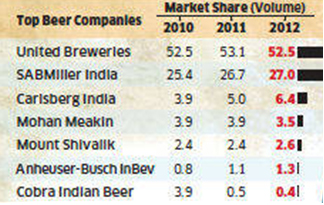Heineken is top shareholder of United Breweries
Though its patience must have been sorely tested, Heineken has emerged as the largest shareholder in United Breweries (UB), after the Dutch picked up a 1.35 percent stake in India’s largest brewing company through deals on the stock exchange in December 2013.
Before, UB chairman Vijay Mallya and Heineken held a 37.49 percent stake each in the beer company which controls more 50 percent of the 20 million hl Indian beer market.
Local media say that Heineken’s share mop-up is significant as the shareholder pact with Mr Mallya had stipulated that neither of them could acquire additional shares in the company. Mr Mallya had operational management control even though Heineken appointed the CFO and had board presence.
It is not clear whether Heineken becoming the largest shareholder would trigger any changes in management control. Mr Mallya is in trouble because his Kingfisher airline is grounded and he is struggling to keep lenders at bay.
It has long been rumoured that Mr Mallya would eventually give up control of the beer business to Heineken, but negotiations have reached an impasse. Naturally, Heineken wants the Kingfisher brand exclusively, which is currently spread across a variety of Mr Mallya’s businesses, reflecting his flamboyance. The airline brand was pledged with the State Bank of India-led consortium, which has refused to release it, derailing a possible deal with Heineken, Indian media claim.
Heineken could pay a premium to gain leadership in India’s beer market, where global brewers have struggled. SABMiller, the second largest brewer, has less than half the market share of UB, down from over 30 percent a few years ago. Rival Carlsberg has 6 percent of domestic beer consumption.
Despite having put some distance between itself and SABMiller in terms of market shares, the top two brewers aren’t far apart when it comes to turnover, local media say. SABMiller India posted a 20 percent jump in sales in the year ended March 2013 at Rs 3,349 crore (USD 530 million). During the same period, UB grew its revenues 6 percent to Rs 3,583 crore (USD 560 million).
However, SABMiller has not posted any profits for several years largely because of increasing investments. It did manage to narrow the losses, though and in 2013 invested around USD 77 million to expand its capacity and portfolio, bringing its investments over the past 12 years to about USD 800 million.
India’s low per capita consumption of beer is attributed to affordability, poor availability and strict regulations. Of the top 30 global beer markets, India has the lowest affordability of beer relative to average GDP (gross domestic product). On average, it requires 54 minutes of work to buy 500 ml of mainstream beer in India compared with the global average of 20 minutes, and 9 minutes’ work in China, according to a recent UBS report. Moreover, on a unit/alcohol content basis, beer is 7 to 8 percent more expensive than spirits.

